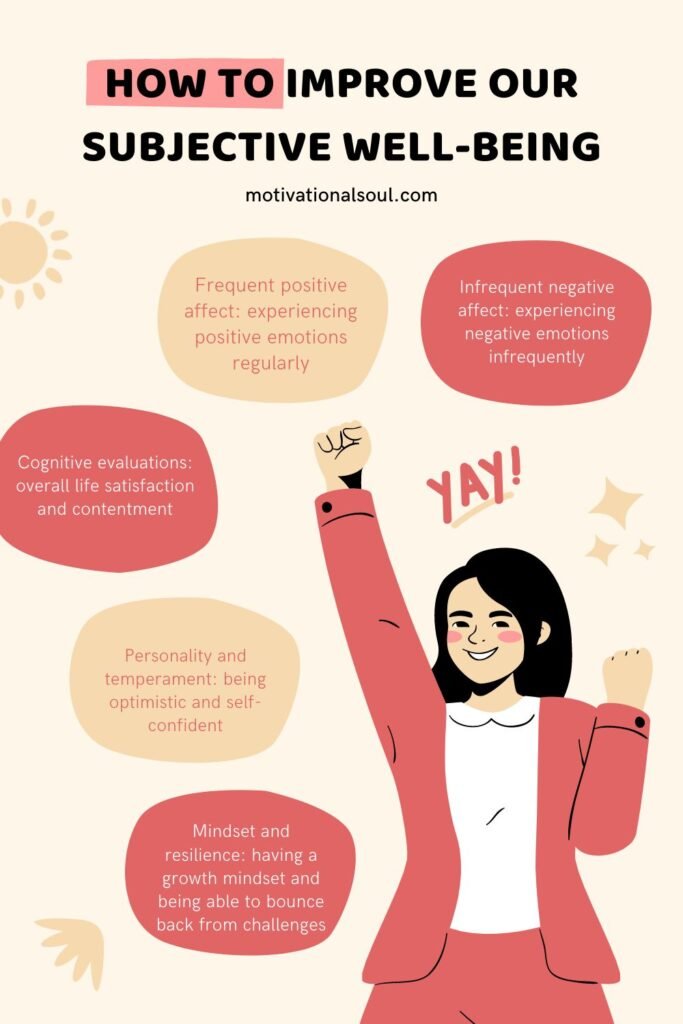How to Improve Our Subjective Well-being

Subjective well-being describes how you personally interpret the rhythms of your emotions, thoughts, and overall mental state. It’s labeled “subjective” because it hinges on your unique perceptions rather than any universal standard. Many researchers argue that subjective well-being outranks more objective markers—like wealth or possessions—in capturing genuine happiness. Below, we’ll journey through what subjective well-being is, why it matters, and practical ways you can nurture it.
“As Henry David Thoreau once wrote, ‘Happiness is like a butterfly; the more you chase it, the more it will elude you, but if you turn your attention to other things, it will come and sit softly on your shoulder.’”
What Is Subjective Well-Being?
Subjective well-being—sometimes called subjective happiness or life satisfaction—means you’re taking stock of your own fulfillment and overall happiness. This includes both your cognitive assessments (how satisfied you believe you are with life) and emotional experiences (how often you feel uplifting versus troubling emotions).
Why Does Subjective Well-Being Matter?
Current evidence reveals that subjective well-being can reshape not just how you feel day to day but also your health, immune resilience, and lifespan. People who maintain higher levels of subjective well-being tend to flourish more in relationships, careers, and communities. Elevating this personal sense of wholeness can even spark broader societal benefits, such as lower crime rates and more robust economies.
“As Aristotle famously said, ‘Happiness depends upon ourselves.’ When we invest in our own sense of well-being, we end up elevating those around us, too.”
In short, by increasing awareness of how subjective well-being works—and how to boost it—you may find ripples of positive change in your life and the lives of others.
History of Subjective Well-Being
Back in 1984, psychologist Ed Diener devised a tripartite model of subjective well-being. He proposed that your contentment depends on three key dimensions:
- Frequent positive affect: regularly experiencing emotions like joy or gratitude
- Infrequent negative affect: encountering fewer spikes of negative emotions
- Cognitive evaluations: feeling genuinely satisfied with your life overall
Since Diener’s early work, researchers have expanded these ideas, measuring how subjective well-being influences everything from personal health to social harmony. Today, there’s a growing movement to champion subjective well-being—not just for individuals but for entire communities.
Signs of Subjective Well-Being
Certain clues reveal a healthy sense of subjective well-being:
- Feeling purpose and satisfaction in everyday life
- Enjoying positive, supportive relationships
- Maintaining a hopeful outlook on the future
- Frequently experiencing uplifting emotions (like joy or hope)
Remember, no one glides through life feeling unbroken happiness. Subjective well-being is an ongoing story, shaped by how you bounce back from challenges and find meaning in both wins and losses.
Types of Subjective Well-Being
Experienced Well-Being (Hedonic)
Experienced well-being captures the raw positive emotions you encounter—happiness, amusement, delight, and also subtler feelings like pride and awe. These moments of joy can galvanize healthier habits and stronger connections. Tapping into your own positive experiences can help sustain both personal and societal well-being.
Eudaimonic Well-Being
On the other hand, eudaimonic well-being is about living a life that resonates with purpose and meaning. People who embrace eudaimonia don’t just pass the days; they pursue goals that mirror their values and passions. It’s about finding a calling larger than yourself and letting that sense of purpose propel you forward.
“Ralph Waldo Emerson said, ‘For every minute you are angry, you lose sixty seconds of happiness.’ Embracing eudaimonic well-being helps ensure fewer of those precious seconds slip away in anger or frustration.”
Causes of Subjective Well-Being
While part of how you feel can stem from innate temperament, environmental elements and personal choices play enormous roles. What delights you might not affect someone else in the same way. Still, researchers have pinpointed several important drivers:
- Basic resources: Access to food, shelter, and safety
- Autonomy: Control over your decisions and direction
- Personal growth: Continual learning, progress, or self-improvement
- Relationships: Positive connections that encourage trust and belonging
- Personality/temperament: A generally optimistic or self-assured stance
- Mindset/resilience: A growth mindset that adapts and rebounds from setbacks
Yet each factor’s importance varies from person to person and culture to culture. What remains constant is the value of discovering and fostering the elements that most resonate with you.
Impact of Subjective Well-Being
Why invest in subjective well-being? Because it illuminates your path to better health, more rewarding social bonds, and sharper productivity. Individuals with robust subjective well-being often become pillars of their communities, showing greater empathy and prosocial actions. At the wider level, societies that advocate for people’s happiness reap improvements in everything from local schools to global economies.
“In the words of Helen Keller, ‘Optimism is the faith that leads to achievement. Nothing can be done without hope and confidence.’ Cultivating that sense of hope can shape not just your life, but the world around you.”
Improve Your Subjective Well-Being
Think of subjective well-being like a garden—everyone’s unique, but there are some universal ways to help it blossom.
Cultivate Positive Relationships
Strong, supportive relationships can anchor your life with joy and meaning. Spend intentional time with those who uplift you, whether it’s a date night with a partner, a weekend trip with friends, or a heart-to-heart phone call with distant relatives. When you’re together, set aside distractions and let genuine warmth and empathy shine through.
Take Care of Your Physical Health
Your body is your foundation. Healthy eating, sufficient sleep, and regular exercise invigorate not just muscles and bones but your sense of self. Activities that reduce stress—like journaling, walking in nature, or practicing yoga—play a vital role in balancing both body and mind.
“As Maya Angelou once observed, ‘My mission in life is not merely to survive, but to thrive; and to do so with some passion, some compassion, some humor, and some style.’ By prioritizing your health, you take a tangible step toward thriving.”
Practice Gratitude
Gratitude invites you to cherish each gift life hands you, no matter how small. Keeping a gratitude journal or mentally listing three things you appreciate every day can amplify positive emotions and remind you of your support system. Focusing on what you have, rather than what you lack, often nourishes a gentler, more optimistic mindset.
Mindfulness
Mindfulness means truly occupying the present moment without judgment. By observing thoughts and emotions as they emerge, you develop a keener awareness of your inner world. This skill can help dissolve stress, enhance emotional regulation, and bring clarity to daily experiences.
Cognitive Behavioral Approaches
Sometimes, we get tangled in unhelpful thoughts or habits. Cognitive behavioral techniques help you unravel these patterns and reshape them into more supportive, realistic ones. This approach can address many mental health challenges, from anxiety to substance abuse, by converting old ways of thinking into new opportunities for growth.
Conclusion
In essence, subjective well-being reflects both how satisfied you are with your life and how often you float in positive feelings instead of sinking in negative ones. Although genetics, circumstances, and culture play a part, many strategies—like nurturing relationships, pursuing meaningful goals, and shifting mindsets—can magnify your overall happiness. There’s no universal recipe, but discovering the methods that speak to you, then persistently tending them, can transform your daily reality.
“Finally, remember these wise words from Abraham Lincoln: ‘Folks are usually about as happy as they make their minds up to be.’ Your subjective well-being is shaped by your intention, your resilience, and the actions you choose—so make them count.”




Recent Comments